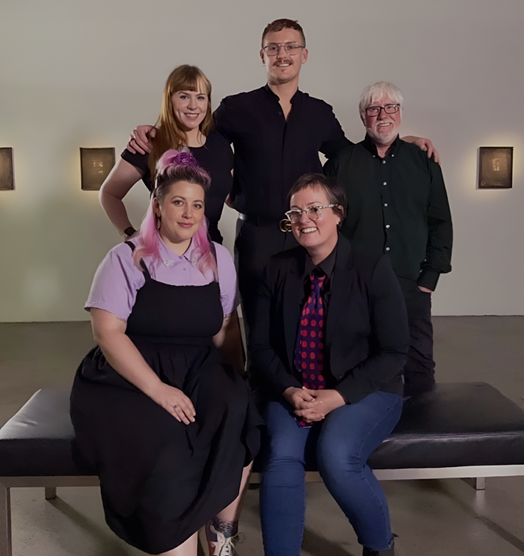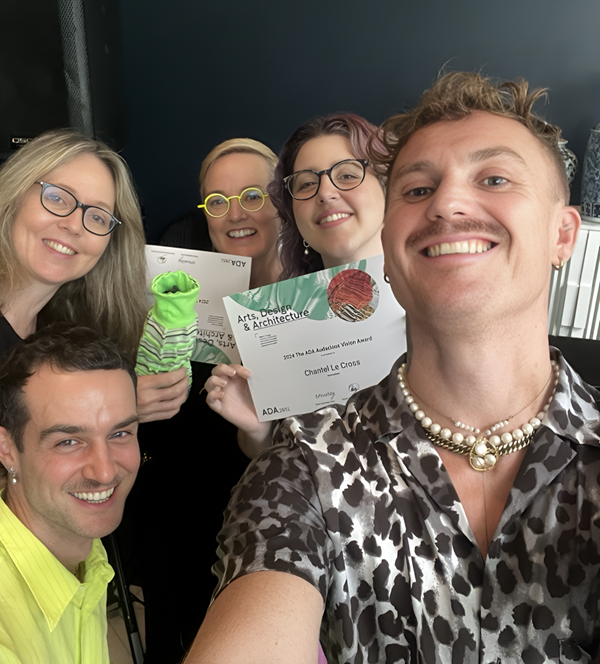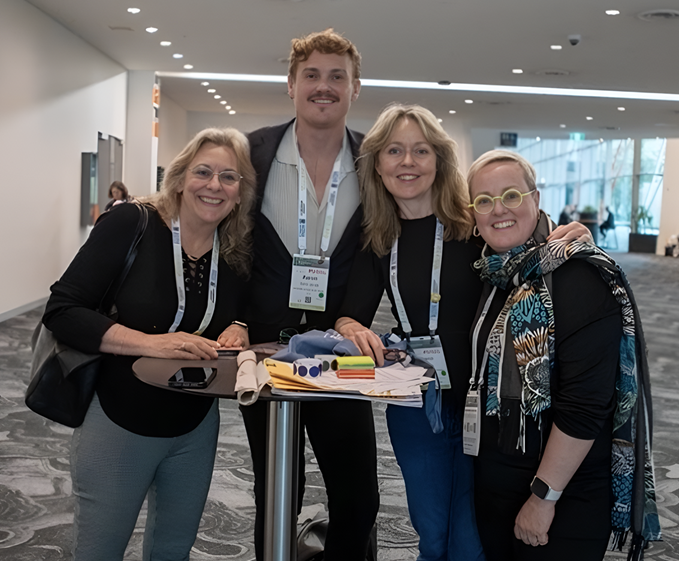Lived experience meets bold action through UNSW's Diversified Project
A university student's drive to create accessible academic assessments has led to the creation of a vibrant, student-led community with plans to change the nature of higher education worldwide.
Diversified ![]() is a collective of neurodivergent students, staff, and educators at The University of New South Wales (UNSW) dedicated to improving the lives of neurodivergent individuals within the university community and beyond. Through research, community education, resource production and advocacy, they are working to embed neuro-inclusion into UNSW's educational framework and policies, helping to create environments where neurodivergent individuals can thrive.
is a collective of neurodivergent students, staff, and educators at The University of New South Wales (UNSW) dedicated to improving the lives of neurodivergent individuals within the university community and beyond. Through research, community education, resource production and advocacy, they are working to embed neuro-inclusion into UNSW's educational framework and policies, helping to create environments where neurodivergent individuals can thrive.
Drawing on the lived experience of its members, the group engages in advocacy and champions positive change.
Formed in 2021, Diversified grew from the experiences of neurodivergent arts and design student – now alumnus – Josie Bober, after she was given an assignment brief that didn't 'fit' her brain's way of processing information/instructions. Rather than simply explain the problem to their professor, Josie redesigned/reformatted the assessment brief and handed it back in. The brief that Josie designed and resubmitted has become a template used in courses across the university, from science to arts, to show how to make assessment instructions more accessible for neurodivergent students. The publication of the brief brought together neurodivergent UNSW students and academics, and thus, Diversified was born.
"When we're put in a system that doesn't acknowledge or have the right systems in place to help support our brains to thrive… it's not us, it's the system that needs to be changed," Diversified's student lead Aaron Saint-James explained. "It's the system that is broken, not us. We're capable, highly intelligent, creative and curious people/students, yet in this tertiary education system, we feel like we're the issue."
When Diversified uses the term "neurodivergent," they're acknowledging and celebrating the natural variations in the way people think, learn, and process information. This includes, but is not limited to, those who identify as autistic, ADHD, dyslexic, dyspraxic, live with Tourettes, OCD, or Epilepsy, those with learning differences, mental health conditions, or other cognitive variances.

Resources to pull down barriers
The students involved in Diversified have been joined by several neurodivergent academics and staff members too. The group initially started off by creating a series of workshops that identify the barriers and challenges that neurodivergent students face in their university courses with academics, in a co-design, co-produced manner.
Designing and running these workshops was cathartic, Aaron explained.
"It was just nice to feel that my challenges and my barriers are not just mine… [and] that I'm not the only one suffering or going through these experiences," he said. "I get quite emotional because students were saying for the first time that they felt heard and seen and acknowledged in a university setting as a neurodivergent student." From those challenges and barriers, Diversified created a set of recommendations for the university to address the problems.
While the group hopes to one day be able to tackle these barriers systemically, recognising that they are common to the experience of neurodivergent students in many universities, for now, they are focused on running workshops to raise awareness and educate UNSW educators on how to be more accessible and inclusive in the way they teach. Diversified's recommendations and resources are based on a universal design for learning framework, which Aaron said is critical to make sure they cater for all abilities and neurotypes.
"There's no one-size-fits-all, but a universal design in a learning environment does cater to more people than the current system or approach."
Diversified has developed and launched an Inclusive Teaching Toolkit now fully accessible to educators worldwide via the Diversified website. The toolkit was co-designed with neurodivergent UNSW students and educators, ensuring it is practical, relevant, and truly supportive of diverse learning needs and is organised around five key themes:
- Inclusive Learning Environment & Culture – Creating welcoming, accessible spaces that celebrate neurodiversity and foster belonging for all students regardless of their neurotype
- Effective Communication & Student Voice – Establishing clear, multi-modal communication strategies while actively incorporating student perspectives and feedback into teaching practices
- Digital Platforms & Assistive Technologies – Leveraging technology tools and platforms to enhance accessibility, provide multiple means of engagement, and support diverse learning needs
- Successful Collaboration – Designing group work and collaborative activities that accommodate different working styles and ensure meaningful participation from all students
- Student Autonomy & Providing Choice – Empowering learners through flexible options in how they access content, demonstrate knowledge, and engage with course materials
The comprehensive toolkit includes six supporting videos of neurodivergent students' lived experience, an implementation roadmap, and access to a supportive community of educators sharing experiences and best practices.
Aaron said the checklist design was deliberate, to try and reduce as many learning/teaching barriers as possible. "We know academics are probably doing a lot of these things already. We don't expect huge changes either – something as small as adding closed captions or a transcript to a recorded lecture can make a huge difference. We don't want students to have to decipher things that academics create, and we don't want that barrier for academics because we want as high an uptake as possible. We're trying to make it accessible and easy to understand and navigate."

'Nothing about us without us'
Aaron said being student-led has been vital to the success of Diversified so far.
"It comes down to that 'nothing about us without us' [ethos]. That's always been our north star, you could say, [because] if you want to speak about a community, you need the community involved," he explained. "And it's not just consultation. A lot of universities use more consultation than true co-design, which is what we do. I know there are a lot of top-down programs, initiatives and projects that just try to solve the challenges of marginalised students, but they don't have that bottom-up approach that we have because we've started from that student perspective."
He believes that this approach has created strong foundations to take Diversified forward in the future when the time comes to expand into other universities or into the system more broadly. The collective's impact has been recognised through multiple awards, including the UNSW ADA Audacious Vision Award in 2024, demonstrating the significant change they're driving in higher education.
Despite their remarkable achievements, Diversified operates without sitting within any specific faculty/division of the university and has relied on just over $80,000 over the past four years, which in the bigger scheme of university budgets is minimal. Aaron acknowledges that to continue expanding their reach and impact, they need a more sustainable funding model and designated research roles that would allow the collective to build on their success and support even more institutions globally.
Aaron encourages educators worldwide to access and implement the toolkit.
"The resources are now available to everyone. We're always open to feedback from educators who are using these tools to create more inclusive learning environments. There may be just a few tweaks you might have to do to make things a bit more inclusive."
He added that pushing for neuro-inclusion takes Diversified beyond standard disability inclusion.
"Neuro-inclusivity within education means proactively creating spaces that physically, academically, culturally, and cognitively celebrate neurodivergent learning perspectives," Aaron said.
"When neurodivergent students are put in the right environment, they can thrive. And there's so much potential."
For Aaron, and for many of the other students involved in Diversified, the collective has given him a place to feel comfortable and safe. Being joined by neurodivergent academics has also helped shape his perspective of what truly inclusive academia could look like.
"Before Diversified, I didn't feel like I had a place. Diversified gave me that safe space where I did feel like I could be my authentic self, and my neurodiversity could be celebrated and acknowledged," he said.
"If I can help ease other people's burdens by making their journey a bit more accessible or inclusive, that's all I want in life."
With their toolkit now publicly available and being implemented globally, Diversified continues to refine and expand its resources based on ongoing feedback from educators. The collective maintains partnerships with institutions like the University of Melbourne to build networks for academics and educators to share best practices and develop new research approaches to neuro-inclusion.
Aaron said the growth of Diversified shows how much its message resonates.
"Never dim your light to fit into systems that weren't built for minds like yours. When something doesn't work, don't assume you're the problem – you might just be the solution the world has been waiting for, as what starts as one student saying 'this doesn't work for my brain' can become a global movement that helps millions of others thrive."

Written by: Danielle Kutchel
(August 2025)

